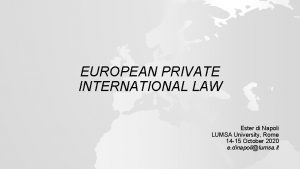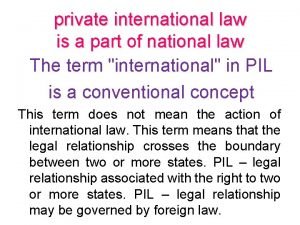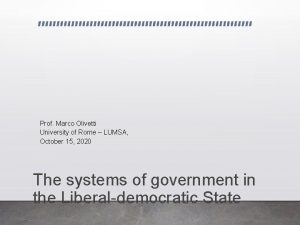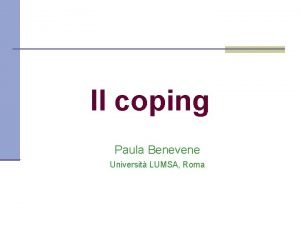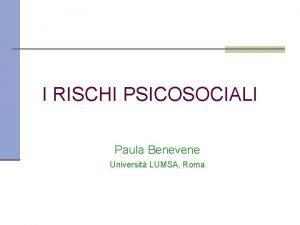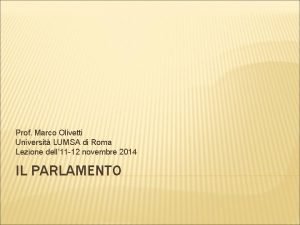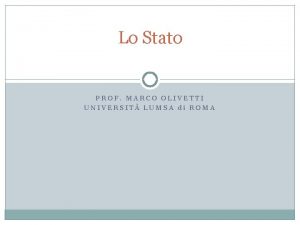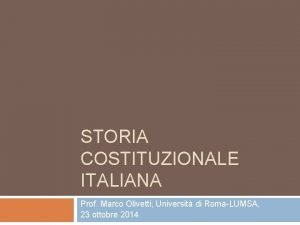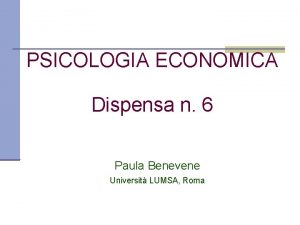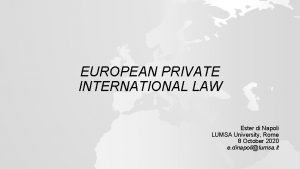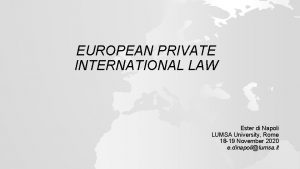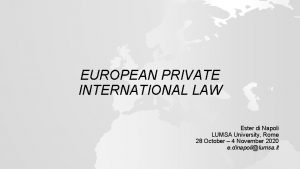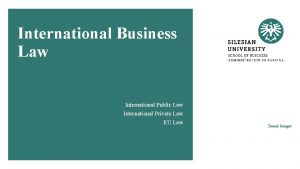EUROPEAN PRIVATE INTERNATIONAL LAW Ester di Napoli LUMSA













- Slides: 13

EUROPEAN PRIVATE INTERNATIONAL LAW Ester di Napoli LUMSA University, Rome 21 October 2020 e. dinapoli@lumsa. it

STATES WITH MORE THAN ONE LEGAL SYSTEM Internal conflict-of-law rules different from conflict-of-law rules Article 22 of Rome I Regulation « 1. Where a State comprises several territorial units, each of which has its own rules of law in respect of contractual obligations, each territorial unit shall be considered as a country for the purposes of identifying the law applicable under this Regulation. 2. A Member State where different territorial units have their own rules of law in respect of contractual obligations shall not be required to apply this Regulation to conflicts solely between the laws of such units» . Examples: two or more territorial units: United States of America, United Kindgom, Spain two or more personal systems: Lebanon, Israel

WHY EUROPEAN PRIVATE INTERNATIONAL LAW? European Private International Law and (substantial) European Law Sources of Private International Law: 1. International Law (international treaties / conventions) 2. National Law 3. European Private International Law / supranational law (EU regulations and directives)

1. INTERNATIONAL LAW International convention dealing with PIL in civil and commercial matters take precedence over national law: a) International (bilateral and multilateral) conventions (database ATRIO – Archivio dei Trattati Internazionali Online: itra. esteri. it) e. g. 1968 Brussels Convention; 1980 Rome Convention; 2007 Lugano Convention b) Commission Internationale de l’État Civil: http: //ciec 1. org c) Hague Conference on Private International Law (HCCH): www. hcch. net

2. NATIONAL LAW - Statutory systems: e. g. Legge 31 maggio 1995, n. 218 di riforma del sistema italiano di diritto internazionale privato (Italy); Loi 16 juillet 2004 portant le Code de droit international privé (Belgium); the Serbian Act on The Law on Resolution of Conflict of Laws with Regulations of Other countries (1982/2006); German Introductory Act to the Civil Code (EGBGB); new Hungarian Private International Law Act (ACT XXVIII of 2017, in force on 1 January 2018); Spanish Civil Code - Chapter IV (Rules of private international law) - Non-statutory systems: e. g. France

3. EUROPEAN PRIVATE INTERNATIONAL LAW / SUPRANATIONAL LAW Primacy of EU Law over national law Coordination with international conventions dealing with the same topic Where we were: 1968 Brussels Convention (art. 220 TEC) 1980 Rome Convention (outside the scope of art. 220 TEC) «parallel» Lugano conventions (1988 and 2007) From the Treaty of Amsterdam (1997). . . The so-called process of «Europeanization» of Private International Law Title IV Articles 61 -67 of the EC Treaty

3. EUROPEAN PRIVATE INTERNATIONAL LAW … where we are (specific competences attributed to the EU in civil and commercial matters): the Treaty of Lisbon (2009): Title V, «Area of Freedom, Security and Justice» (AFSJ), Article 67 of the Treaty on the Functioning of the European Union (TFEU): ” 1. The Union shall constitute an area of freedom, security and justice with respect for fundamental rights and the different legal systems and traditions of the Member States. 2. It shall ensure the absence of internal border controls for persons and shall frame a common policy on asylum, immigration and external border control, based on solidarity between Member States, which is fair towards third-country nationals. For the purpose of this Title, stateless persons shall be treated as third-country nationals. 3. The Union shall endeavour to ensure a high level of security through measures to prevent and combat crime, racism and xenophobia, and through measures for coordination and cooperation between police and judicial authorities and other competent authorities, as well as through the mutual recognition of judgments in criminal matters and, if necessary, through the approximation of criminal laws. 4. The Union shall facilitate access to justice, in particular through the principle of mutual recognition of judicial and extrajudicial decisions in civil matters”.

3. EUROPEAN PRIVATE INTERNATIONAL LAW Article 81 of the TFEU: « 1. The Union shall develop judicial cooperation in civil matters having cross-border implications, based on the principle of mutual recognition of judgments and of decisions in extrajudicial cases. Such cooperation may include the adoption of measures for the approximation of the laws and regulations of the Member States.

3. EUROPEAN PRIVATE INTERNATIONAL LAW 2. For the purposes of paragraph 1, the European Parliament and the Council, acting in accordance with the ordinary legislative procedure, shall adopt measures, particularly when necessary for the proper functioning of the internal market, aimed at ensuring: (a) the mutual recognition and enforcement between Member States of judgments and of decisions in extrajudicial cases; (b) the cross-border service of judicial and extrajudicial documents; (c) the compatibility of the rules applicable in the Member States concerning conflict of laws and of jurisdiction; (d) cooperation in the taking of evidence; (e) effective access to justice; (f) the elimination of obstacles to the proper functioning of civil proceedings, if necessary by promoting the compatibility of the rules on civil procedure applicable in the Member States; (g) the development of alternative methods of dispute settlement; (h) support for the training of the judiciary and judicial staff.

3. EUROPEAN PRIVATE INTERNATIONAL LAW 3. Notwithstanding paragraph 2, measures concerning family law with cross-border implications shall be established by the Council, acting in accordance with a special legislative procedure. The Council shall act unanimously after consulting the European Parliament. The Council, on a proposal from the Commission, may adopt a decision determining those aspects of family law with cross-border implications which may be the subject of acts adopted by the ordinary legislative procedure. The Council shall act unanimously after consulting the European Parliament. The proposal referred to in the second subparagraph shall be notified to the national Parliaments. If a national Parliament makes known its opposition within six months of the date of such notification, the decision shall not be adopted. In the absence of opposition, the Council may adopt the decision» .

3. EUROPEAN PRIVATE INTERNATIONAL LAW European legislative instruments adopted in the field of judicial cooperation in civil and commercial matters (which has a broad meaning, comprehensive of the field of family law with cross-border implications): - regulation (EC) n. 44/2001 on jurisdiction and the recognition and enforcement of judgments in civil and commercial matters ( «Bruxelles I» ), now subsituted by regulation (EU) n. 1215/2012 ( «Bruxelles I bis» ); - regulation (EC) 1206/2001 on cooperation between the courts of the Member States in the taking of evidence in civil or commercial matters; - regulation (EC) n. 2201/2003 concerning jurisdiction and the recognition and enforcement of judgments in matrimonial matters and the matters of parental responsibility ( «Bruxelles II bis» ), soon to be substituted by regulation 2019/1111 - regulation (EC) n. 1393/2007 on the service in the Member States of judicial and extrajudicial documents in civil or commercial matters (service of documents); - regulation (EC) n. 4/2009 on jurisdiction, applicable law, recognition and enforcement of decisions and cooperation in matters relating to maintenance obligations ; - regulation (EC) n. 861/2007, establishing a European Small Claim Procedure;

3. EUROPEAN PRIVATE INTERNATIONAL LAW - regulation (EC) n. 805/2004, creating a European Enforcement Order for uncontested claims; - regulation (EC) n. 1896/2006 creating a European Order for Payment procedure; - regulation (EC) n. 593/2008 on the law applicable to contractual obligations ( «Rome I» ); - regulation (EC) n. 864/2007 on the law applicable to non-contractual obligations ( «Rome II» ); - regulation (EU) n. 650/2012 on jurisdiction, applicable law, recognition and enforcement of decisions and acceptance and enforcement of authentic instruments in matters of succession and on the creation of a European Certificate of Succession; - regulation (EU) n. 606/2013 on mutual recognition of protection measures in civil matters; - regulation (EU) n. 655/2014 establishing a European Account preservation order procedure to facilitate cross-border debt recovery in civil and commercial matters ( «EASO» ) - regulation (EU) 2015/848 on insolvency proceedings; - regulation (EU) 2016/1103 on matrimonial property regimes; - regulation (EU) 2016/1104 on the property consequences of registered partnerships - regulation (EU) 2016/1191 on promoting the free movement of citizens by simplifying the requirements for presenting certain public documents in the European Union.

A «TWO-SPEED EUROPE» - The position of UK and Ireland (opting in) – Protocol n. 21 + Brexit - The position of Denmark (opting out) – Protocol n. 22 - Family matters - The enhanced cooperation mechanism (article 326 ff. ): Regulation (EU) n. 1259/2010 implementing enhanced cooperation in the area of the law applicable to divorce and legal separation ( «Rome III» ) Regulation (EU) 2016/1103 implementing enhanced cooperation in the area of jurisdiction, applicable law and the recognition and enforcement of decisions in matters of matrimonial property regimes; Regulation (EU) 2016/1104 implementing enhanced cooperation in the area of jurisdiction, applicable law and the recognition and enforcement of decisions in the matters of the property consequences of registered partnerships.

